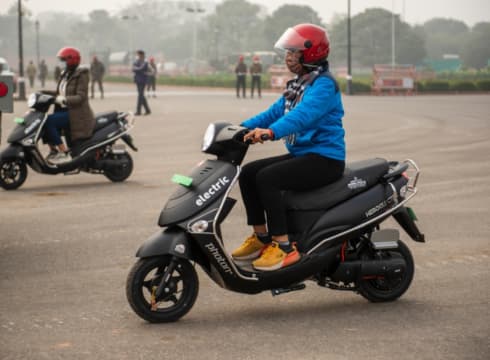The investigation by the Department of Revenue Intelligence covers the import of EV components and likely customs duty evasion
The Ministry of Heavy Industries might also lodge a formal legal complaint with the law enforcement agencies to look into the matter
The development comes at a time when the government has stopped disbursing the subsidies to EV players like Hero Electric and Okinawa Autotech for flouting FAME--II norms
Inc42 Daily Brief
Stay Ahead With Daily News & Analysis on India’s Tech & Startup Economy
After tightening regulations around claiming subsidies under the FAME-II scheme, the Centre has now reportedly initiated a probe into the import of components by two-wheeler electric vehicle (EV) manufacturers and is exploring legal options to recover the wrongly claimed subsidies.
The development, reported by the Economic Times, comes at a time when the government has stopped disbursing the subsidies to two-wheeler EV manufacturers like Hero Electric and Okinawa Autotech for flouting minimum localisation requirements for components used in making their vehicles.
“The Directorate of Revenue Intelligence (DRI) has flagged issues with the implementation of the FAME scheme to the Ministry of Heavy Industries…They have initiated a probe into the imports,” a senior government official was quoted as saying by the publication.
The official reportedly also said that the investigation covers the import of EV components and likely customs duty evasion.
Under the government’s FAME-II scheme, which has a total outlay of 10,000 Cr, domestic EV makers are allowed to offer a discount of up to 40% on the cost of their vehicles and claim it from the government as a subsidy. However, EV manufacturers also need to ensure that at least 50% of products use locally-manufactured components to claim the subsidy.
After receiving complaints about manufacturers flouting FAME-II norms, the Indian government started to examine the matter last year. The Automotive Research Association of India (ARAI) is investigating the companies.
As per the ET report, the ministry might now lodge a formal legal complaint with the law enforcement agencies to look into the matter.
The Centre’s decision has already hurt several EV players. Two-wheeler EV manufacturers like Hero Electric, Okinawa Autotech, Ampere Vehicles, and Pure EV, which were among the top players in the category, have witnessed a significant slump in their demand since November last year. This led to a marginal decline in total two-wheeler EV registrations to 64,298 units in January 2023 from 64,527 units in December 2022.
Meanwhile, the Society of Manufacturers of Electric Vehicles (SMEV) wrote to the Parliamentary Standing Committee on Electric & Hybrid Mobility in January opposing the government’s decision to suspend subsidies at a time when EV adoption is picking pace.
“The action of the DHI (Department of Heavy Industry) in suspending subsidies to the top EV manufacturers is fundamentally bad in law. There is no precedent, no allocation for this kind of action. There was no show cause; there was no dialogue, or discussions. This arbitrary action has the potential of dismantling the entire FAME architecture, making a mockery of the very proposal that gave EV adoption a fillip,” the SMEV said.
Besides, the industry body also highlighted that INR 1,100 Cr worth of subsidy, which the EV manufacturers, who are largely startups, have passed on to the customers, is held up in the DHI’s coffers, earning interest.
Government’s Role In EV Adoption
It must be noted that India witnessed a significant rise in EV demand in 2022. While the total number of vehicle registration surpassed the 10 Lakh mark for the first time last year, two-wheelers EVs saw a 4X year-on-year rise in registration to over 6.2 Lakh units. This was largely driven by the subsidy provided under the FAME-II scheme and other policies of state governments.
The Centre said it subsidised more than 7.4 Lakh EVs to the tune of INR 3,200 Cr till December 7 last year. The FAME-II scheme, which ends in 2024, aims to incentivise 10 Lakh two-wheelers EVs, 7,090 ebuses, and 5 Lakh electric three-wheelers. However, of the INR 10,000 Cr budget allocation under FAME-II, the government had spent just INR 2,464.27 Cr as demand incentives till December 9.
The EV industry was hoping that the government would extend the validity of the FAME-II scheme beyond 2024 in the Union Budget 2023-24, which was presented earlier this week. However, the Centre made no such announcement.
While the government increased the allocation for FAME-II to INR 5,172 Cr in the Budget for FY24 from INR 2,898 Cr in FY23, it essentially doesn’t change the total outlay.
“The overall outlay of INR 10,000 Cr made by the government under FAME II scheme remains unchanged in the recent Budget. The outlay shown in FY24 has increased because the subsidies in excess of Rs 1,100 Cr that the OEMs have already passed on the customers in FY22 and FY23 have not yet been disbursed and therefore a large amount of funds are now shifted to FY24,” Sohinder Gill, director general of SMEV, said in a statement.
Meanwhile, several industry experts said that Budget 2023-24 announcements for giving a push to the EV industry lacked specifics and were not path-breaking overall.
The government expects the domestic EV market to grow at a compound annual growth rate (CAGR) of 49% during 2022-2030 and hit 1 Cr units of annual sales by 2030, creating 5 Cr direct and indirect jobs, as per the Economic Survey 2022-23.
{{#name}}{{name}}{{/name}}{{^name}}-{{/name}}
{{#description}}{{description}}...{{/description}}{{^description}}-{{/description}}
Note: We at Inc42 take our ethics very seriously. More information about it can be found here.


